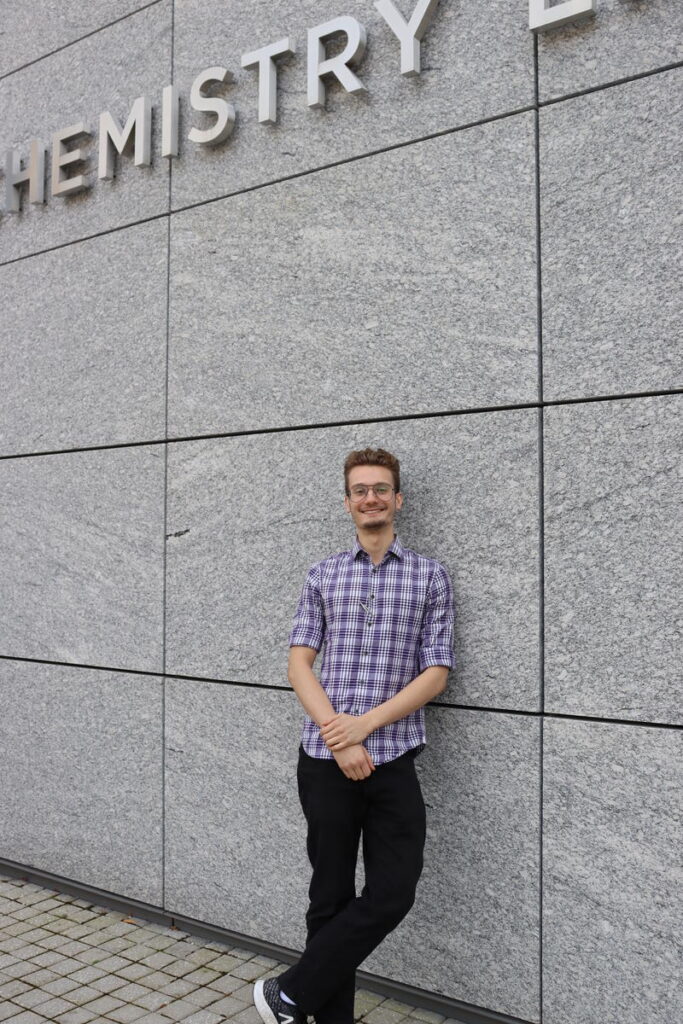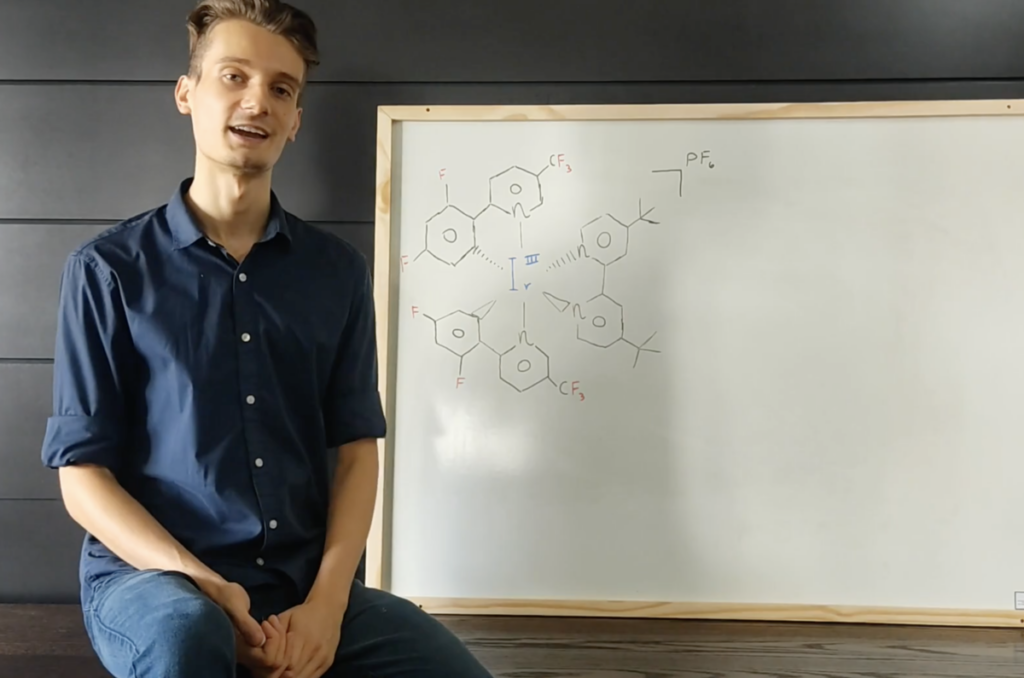Undergrad Q&A: André Luiz Koch Liston
When André Luiz Koch Liston, UG ’23, found his sister’s high school chemistry book at their childhood home in Brazil, the Periodic Table of Elements became an instant source of fascination. For him, it answered as many questions as it posed, and jumpstarted a chemistry career that has already set Liston apart as a scholar with enormous potential. Liston won Princeton’s George B. Wood Legacy Sophomore Prize in August, and his three-minute video on iridium photocatalysts won an award at Princeton Research Day 2021. After a summer at the Max Planck Institute coding tensor networks and two years of research under the Scholes Group, Liston is moving over to the Schoop Lab this spring. Here, he talks about why chemistry drew him in from the start.

André Luiz Koch Liston outside Frick Laboratory.
WHY CHEMISTRY?
Chemistry tends to be one of those subjects people either love or hate. I was always captivated by the idea that, ‘Oh, this is what stuff is made of and I’m going to tell you all about it.’ I love the story it tells, the notion of describing material things. Since I was a child, I had questions for which the answers were somewhat unsatisfying, until that day I crossed with my sister’s textbook. I remember seeing the periodic table and thinking, is this really true? Is everything made of atoms, and if so, how does this work?
HOW DID YOU SETTLE ON THIS CONCENTRATION SO EASILY?
This is actually a great question and one I think every undergraduate grapples with. You have to declare your major but you’re encouraged to take various classes in all sorts of subjects, so how do you settle the question? For me, the answer came when I was thinking about the time I could spend doing things. I enjoy reading. I enjoy swimming. But the one thing I enjoy doing for the longest amount of time is studying chemistry. There is something about trying to understand and make sense of real-life objects that just keeps me going for hours and hours.
For me, the answer came when I was thinking about the time I could spend doing things. I enjoy reading. I enjoy swimming. But the one thing I enjoy doing for the longest amount of time is studying chemistry. There is something about trying to understand and make sense of real-life objects that just keeps me going for hours and hours.
YOU’RE ALSO PURSUING CERTIFICATES IN MATERIAL SCIENCE AND ENGINEERING?
That was almost out of coincidence. Chemistry develops its utility from being a very central and experimental science, so being able to bridge that gap between molecular behavior in very small-scale systems and macro-scale objects we deal with, I think that’s fascinating.
… AND YOU’RE A RESIDENT COLLEGE ADVISOR AT FIRST?
In talking especially to seniors and what they look back on with a smile, all of them say they wish they had been more engaged with others. Because of the Princeton curriculum, everyone walks out of here having a lot of in-lab hours and independent work. It’s what we enjoy doing. But the things we’ll remember most are the things that happen in between those blocks of work. I thought the RCA role would expose me to that a little bit more. And it definitely has. It’s been a lovely experience.
IS IT UNUSUAL FOR AN UNDERGRAD TO DO SO MUCH RESEARCH?
The Department of Chemistry does offer a lot of guidance for undergrads who declare the major and how to actually select a lab. That said, some students walk in with a bit more eagerness to be involved, and those students usually end up doing more research on their own. Because of thesis requirements, most professors are pretty open to this since they know you’re going to be doing your thesis work with them. The photo subgroup in the Scholes Lab (BioLEC) was very cool stuff, and then there is some very interesting solid-state research being done by Professor Schoop.

Liston presenting his award-winning video lecture on iridium photocatalysis for Princeton Research Day 2021.
WHAT WILL YOU BE WORKING ON WITH THE SCHOOP LAB?
Precisely, the interaction between solid-state materials—crystals and solids in general—and light. Both of those are extremely cool subjects, because solids are not a trivial thing. Describing them using molecules is very confusing because technically a crystal lattice is one unending, infinite chain of molecules, so you’re not really talking about orbitals anymore; you now have to talk about band gaps and conduction in bands, and it’s a whole new way of thinking about electrons and nuclei.
WHY DOES THIS WORK INTRIGUE YOU?
When you’re young, you are first told, atoms exist. And then you are told, molecules exist. And that’s when you learn about molecular orbital bonding. And now I’m told, well, crystals are a very special type of molecule and you have to think of them in a different way. And then you have light, which is this very unusual thing in our universe, right? It has all sorts of unusual properties. It behaves oftentimes as if it has mass. It can occupy the same space at once. It interferes with itself. So, what happens when you combine those things? You usually end up with very extreme circumstances. That’s what really gets me going: how you can impart extreme conditions and extreme phenomena on solid-state crystals using light.
WHAT HAS YOUR YEAR BEEN LIKE SO FAR?
At the beginning of every year, I try to guess what’s going to be the theme for that academic year in my life. Being halfway through this year, I can say the theme for this semester is ‘tolerance to insufficiency’—just being cognizant of the insufficient knowledge I have on everything. It definitely gets better over time. But as an undergraduate, every day you learn how little you know. In high school, the stories they tell you tend to be very cohesive. Physics agrees with chemistry, and all of them agree with mathematics, and then all of them agree with biology. So the stories are nicely told. But once you get into real-life research, there’s a lot of doubt. There are many competing, different theories and different ways to explain the same phenomena.
WHAT NEW SKILLS HAVE YOU DEVELOPED AT PRINCETON?
I think I would go with anticipating how quickly I will understand that I don’t understand a subject. It’s like the Dunning-Kruger Effect, where at the start of your learning curve you have a lot of confidence in what you’re saying because you know so little, but as you learn more that confidence decreases. That’s very useful. The first time that catches you without a warning, it’s quite demoralizing. You wonder, how am I going to contribute anything meaningful? But eventually you start to realize the pattern: I’m going to start studying, I’m going to think I understand it, and then I’m going to realize that I don’t. Having that awareness ahead of time really counterbalances the feeling of being lost in an academic subject.
ARE YOU CONSIDERING PLANS FOR AFTER GRADUATION?
I don’t know, but I really enjoy research. Especially now that I know how little I know, I have to keep striving to learn more and so graduate school seems like the ideal next step.
